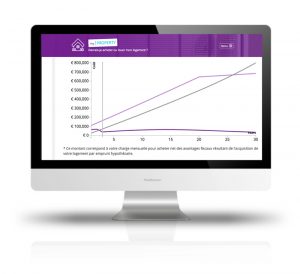Your real estate project in Luxembourg: How to make the most out of the available tax advantages
While it is obvious that we invest not primarily in real estate to optimise taxes, certain tax provisions make it possible to significantly minimise the real cost of acquisition or investment. At the condition to know them and make your decisions accordingly.
Whether it is a question of no longer paying rent or a patrimonial strategy, the choice of investing in real estate generally goes beyond the question of tax advantages alone. This being so, no one is against some advice to optimise one’s situation.
The acquisition of your primary residence
Optimisation for the primary residence may concern the down payment, the type of purchase, the insurance and the contracted loan. At the condition to complete a tax return.
(…) Optimisation for the primary residence may concern the down payment, the type of purchase, the insurance and the contracted loan.
The down payment
By deciding to contribute to a home savings plan, you benefit from a deductibility of the contributions up to €1,344 per person in the tax household (of less than 40 years old, otherwise €672).
Imagine that you have set aside €4,032 via your home savings plan to build up your down payment. Considering that you have a child and that you are subject to the marginal tax rate of 41.73% (applicable for people with annual income above €45,897), these €4,032 will in reality cost you only €2,349.
The type of purchase
Purchasing off-plan can enable you to significantly reduce your registration fees. These are calculated only on the land share of the property (generally representing between 35% and 40% of the total purchase price in Luxembourg City). A benefit that needs to be mitigated for a first purchase since the registration tax credit (Bëllegen Akt) allows you to pay almost no registration fees for the purchase of an existing property (up to €285,714 for a single and €571,428 for a couple).
 An off-plan purchase of your primary residence allows you to benefit from the super reduced VAT rate of 3% on the property’s construction share up to €357,143, representing a tax benefit of €50.000. Please remember that unless you transfer it to an owner-occupant, you must repay this VAT-reduction if you resell your new property before having lived there for two years.
An off-plan purchase of your primary residence allows you to benefit from the super reduced VAT rate of 3% on the property’s construction share up to €357,143, representing a tax benefit of €50.000. Please remember that unless you transfer it to an owner-occupant, you must repay this VAT-reduction if you resell your new property before having lived there for two years.
The insurances
At the time of purchase, your bank systematically requests to subscribe to a mortgage insurance to cover any risk of death or incapacity of the borrower. Although single premium insurance is a very significant additional expense compared to an annual premium one, its real costs are heavily reduced through their deductibility, in most cases entirely. In general, the single premium only costs you 58% of its price!
In comparison, annual premiums are mixed up with all other insurance premiums you pay (e.g. life, death, disability, accident, sickness, civil liability) and with the interests on non-mortgage loans. This group is deductible only up to €672 per person of the tax household and per year. Not only are you not sure that you can fully deduct these annual premiums, but you are also deprived of the possibility of using other tax deductible products such as life insurance.
The mortgage
Even if you could allocate a large down payment, get a loan to finance your acquisition and benefit from the interest deductibility (€2,000 per person in the tax household for the first six years of occupation, €1,500 for the next five years and €1,000 for the following). Adding to low interest rates, these interest deductions generally allow an effective loan rate often close to 1%! And if your employer applies the interest subsidy, you get €3,000 extra deductible interests per person (excluding children). For a couple with a child, this represents an annual deduction of €12,000 of mortgage interests!
Buy-to-let investment
Regarding a buy-to-let investment, in addition to advising taking a loan due to the unrestricted deductibility of interests on net rental income, your optimisation is intimately linked to the envisaged type of property. On this point, two types of properties are of particular interest to the investor: a property purchased off-plan or a property over 60 years in need of renovation.
(…) two types of properties are of particular interest to the investor: a property purchased off-plan or a property over 60 years in need of renovation.
Off-plan property
For such a purchase, you benefit from:
- the reduction of registration fees as they are calculated only on the land share of the property, in Luxembourg City +/- 35% of the property’s price (a saving of about 4.5% on the investment costs that largely offset the net interest costs during the construction period);
- the accelerated tax depreciation of 6% on the property’s construction share for the first six years of the property. This most often generates negative net rental income and allows substantial tax savings on other incomes (including employment) to be realized.
Certain choices such as the date of delivery of one’s property or its holding period can improve the net return of investors.
Property over 60 years requiring renovation
For such a purchase, you benefit from:
- a tax depreciation of 3% on the property’s construction share (fixed at 80% of the purchase price);
- the accelerated tax depreciation of 6% on renovation work carried out (up to 20% of the purchase price of the property)
Holding period of your property
We strongly recommend that you avoid selling your buy-to-let investment in the first two years. Instead of a tax on a so called speculative profit, this allows a taxation as long-term capital gain on the potential capital gain on the sale of the property. You will benefit:
- from a taxation at 50% of the global income tax rate instead of a taxation at the marginal rate. Compared to the taxation on the speculative profit, this represents a saving often higher to 65%;
- from a decennial lump-sum deduction of €50,000 (€100,000 for a couple);
- from the revaluation of the purchase price, which is only applicable if the property was purchased more than three years ago.


 Mortgage
Mortgage Personal loan
Personal loan Savings
Savings